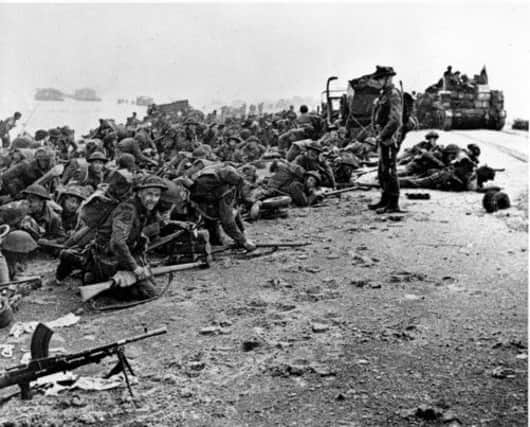Normandy: Veterans asked to tell their stories


He had arrived in northern France a young man but also a grizzled soldier, having already served in North Africa and Sicily, campaigns he hoped would, at least in part, inoculate him from the horror that lay in wait.
“When our company arrived, we had no feelings of grief or any emotions like that,” he recalled. “We were hardened bastards – the more you experienced, the harder you got.”
Advertisement
Hide AdAdvertisement
Hide AdA corporal with the 5th Seaforth Highlanders now aged 93 and living in Rosyth, he retains a lucid memory of the landings on the beaches and the battles which lay beyond them, not least an incident east of Caen in the middle of June.
“I remember a young laddie getting out of a tank and being hit by a mortar,” he said. “I went to help and realised he was so badly wounded, it would be better to attend to other injured men who had a better chance of living.
“I turned to the company commander and said that although I’d take him to the casualty clearing station as soon as I could, he didn’t have a hope in hell. Just as I said that, the laddie opened his eyes, gave me a horrible look, and died.”
It is a remarkable personal account of one of the most brutal campaigns in military history, but increasingly such stories are being lost forever as the last remaining veterans of Normandy succumb to the ravages of time.
Now, work is under way to reach out to the surviving participants to create a permanent record of their harrowing testimonies.
In one of its final acts before it is due to disband next autumn, the Normandy Veterans Association (NVA) is appealing for Scottish veterans to take part in the landmark project which aims to film interviews with the dwindling band ahead of the campaign’s 70th anniversary next summer. In time, it is hoped the records will take pride of place in museums across the country.
Described as a “reflective record” of heroism and sacrifice, the initiative faces two significant challenges – raising enough funds and tracking down and speaking to the veterans that remain before the voices of those who stormed the sands fall silent.
“These are men who brought freedom back to Europe, a freedom that we all continue to enjoy today,” said Alastair Dutch, an associate member of the NVA and executive producer of the project to create a DVD boxset of the interviews. “We all have a debt of gratitude to the Normandy veterans.
Advertisement
Hide AdAdvertisement
Hide Ad“We hope that the veterans and their families will be able to look back on their testimonies, but this is something which will also act as a resource for future generations to learn about what these men did in an extraordinary moment in history.”
The task facing Mr Dutch and the association is a formidable one. Whereas the organisation could count upon more than 10,000 members at the turn of the millennium, the passing of more than a decade has made a vast difference.
Nowadays, the NVA has around only 600 members, a figure which continues to fall. The average age of a Normandy veteran is now 91, and it is estimated that around three men are lost from the hardy band every month.
The problem is particularly acute in Scotland, where according to the association only one veterans branch remains, meeting occasionally in Edinburgh, an altogether different picture from a generation or two ago.
Mr Dutch said: “There used to be branches throughout Scotland, but as the members died no-one has stepped up to the plate to keep them going, and they just fade away.
“But Scots were a very important part of Normandy. It was the biggest invasion ever, and it’s never been equalled. The Scottish regiments were an integral part of the British Army, and it had a major influence on the infantry force through Normandy and north-west Europe.
“Not everyone became a member of the association and we think there must be hundreds of veterans still living in Scotland.”
The association has been encouraged by a recent flurry of men, mindful that 2014 will in all likelihood herald the last major anniversary of the campaign, expressing enthusiasm for the project. So far, around 40 interviews have been documented, with the hope that many more narratives will be captured in the months ahead.
Advertisement
Hide AdAdvertisement
Hide Ad“I think the biggest reason we have had veterans getting in touch is their own mortality. They want to speak before they are too old,” Mr Dutch added. “Similarly, a lot of their children and grandchildren know a great deal about Normandy through being taught about it in school, and that is encouraging some veterans themselves to come forward.”
For Mr Younie, the initiative is a timely and welcome one. His branch of the NVA is now defunct, and he knows only around seven other veterans in the region, two of whom are wheelchair-bound.
He hopes to attend events in Normandy next June and envisages the filmed interviews as a crucial means of ensuring the dark days of June 1944 can never be repeated.
“Looking back, every day is a bonus. It’s difficult to explain this, but I really was very, very fortunate during the whole war,” he said. “Many is the time I walked away from battles where boys were lying dead.
“This will be the last big anniversary, and it will mean a lot because we always think of the boys we left behind, and we always will. I hope and pray that when I have gone, our experiences are kept in memory so that such a thing never, ever happens again.”
• Veterans wishing to take part in the project, or members of the public wishing to make a donation should contact Alastair Dutch on 07931 343 403 or [email protected]